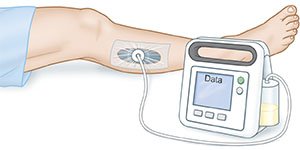Gunshot Wound to the Head or Neck
Medically reviewed by Drugs.com. Last updated on Apr 6, 2025.
A gunshot (GSW) to the head or neck may cause damage to your brain, skull, spine, eyes, or major blood vessels.
DISCHARGE INSTRUCTIONS:
Call 911 for any of the following:
- You have any of the following signs of a stroke:
- Numbness or drooping on one side of your face
- Weakness in an arm or leg
- Confusion or difficulty speaking
- Dizziness, a severe headache, or vision loss
- Have someone call 911 if you have a seizure or cannot be woken up.
- You feel lightheaded, short of breath, and have chest pain.
- You cough up blood.
- You have trouble breathing.
Return to the emergency department if:
- Blood soaks through your bandage.
- You feel a hard lump in your neck.
- Your wound comes apart.
- Your arm or leg feels warm, tender, and painful. It may look swollen and red.
- You vomit blood.
- You have difficulty swallowing.
- You feel weak, dizzy, or faint.
Contact your healthcare provider if:
- You have a fever.
- Your wound is red, swollen, or draining pus.
- You have nausea or are vomiting.
- You have questions or concerns about your condition or care.
Drugs used to treat this and similar conditions
Lasix
Lasix is a loop diuretic used to treat fluid retention from heart, liver, or kidney conditions, and ...
Dexamethasone Intensol
Dexamethasone Intensol is used for addison's disease, adrenal insufficiency, adrenocortical ...
Ozempic
Learn about Ozempic (semaglutide) for type 2 diabetes treatment, weight management, cardiovascular ...
Bumetanide
Bumetanide systemic is used for ascites, autism, edema, pulmonary edema
Spironolactone
Spironolactone is a potassium-sparing diuretic that is primarily used to treat heart failure, high ...
Mannitol
Mannitol systemic is used for cerebral edema, cystic fibrosis, diagnosis and investigation, oliguria
Hydrochlorothiazide
HCTZ (hydrochlorothiazide) used to treat high blood pressure (hypertension) and edema. Includes ...
Aldactone
Aldactone (spironolactone) is used to diagnose or treat a condition in which you have too much ...
Torsemide
Torsemide systemic is used for ascites, edema, heart failure, high blood pressure, nonobstructive ...
Medicines:
You may need any of the following:
- Prescription pain medicine may be given. Ask your healthcare provider how to take this medicine safely.
- Antibiotics may be given to help treat or prevent an infection caused by bacteria.
- NSAIDs , such as ibuprofen, help decrease swelling, pain, and fever. This medicine is available with or without a doctor's order. NSAIDs can cause stomach bleeding or kidney problems in certain people. If you take blood thinner medicine, always ask your healthcare provider if NSAIDs are safe for you. Always read the medicine label and follow directions.
- Take your medicine as directed. Contact your healthcare provider if you think your medicine is not helping or if you have side effects. Tell your provider if you are allergic to any medicine. Keep a list of the medicines, vitamins, and herbs you take. Include the amounts, and when and why you take them. Bring the list or the pill bottles to follow-up visits. Carry your medicine list with you in case of an emergency.
Self-care:
- Rest for the first 24 hours. Slowly return to your normal activities as directed. You may not be able to play sports or do activities that may result in an injury to your head.
- Have someone wake you at different times during the night as directed. Have the person ask you a few questions to see if you are thinking clearly. An example would be to ask your name or your address.
Wound care:
- Care for your wound as directed. Remove your bandage before showering unless your healthcare provider tells you not to. Carefully wash the wound with soap and water. Dry the area and put on new, clean bandages as directed. Change your bandages when they get wet or dirty. Monitor your wound for signs of infection, such as redness, swelling, or pus.
- If you have an open wound, do not shower or get your wound wet. Your healthcare provider will tell you when your wound can get wet. Change the packing and bandage as directed. You may need to clean or rinse your wound each time you change the packing. Wash your hands before you remove packing and again before you place new packing. Ask your healthcare provider how to care for your open wound.
- Negative pressure wound therapy (NPWT) uses a machine called a wound vac, wound vacuum, or pump to help with wound healing. Suction from the machine removes excess drainage from your wound and pulls wound edges closer together. NPWT promotes healthy tissue growth by increasing blood flow to your wound. NPWT also reduce bacteria that cause infections. You and your healthcare providers will be taught about your specific NPWT machine, alarms, and dressing changes.

Get support:
It is normal to have difficult and unexpected feelings after being shot. You may have feelings such as anger, depression, fear, or anxiety. You may have nightmares or continue to think about what has happened. Talk to your healthcare provider if you have any of these feelings. Treatments are available to help you.
Follow up with your healthcare provider as directed:
Write down your questions so you remember to ask them during your visits.
© Copyright Merative 2025 Information is for End User's use only and may not be sold, redistributed or otherwise used for commercial purposes.
The above information is an educational aid only. It is not intended as medical advice for individual conditions or treatments. Talk to your doctor, nurse or pharmacist before following any medical regimen to see if it is safe and effective for you.
Learn more about Gunshot Wound to the Head or Neck
Care guides
Further information
Always consult your healthcare provider to ensure the information displayed on this page applies to your personal circumstances.
